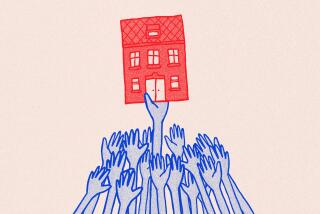Slipshod Fixer-Uppers
- Share via
I enjoy reading the Real Estate Section, yet I am often shocked by the conflicting objectives presented by the information and opinion given.
One day, you will devote substantial space to information aimed at helping the first-time buyer acquire a home, and a few weeks later an article like “Profit From Fixing Up Ugly Duckling Houses” by Robert J. Bruss (July 30) appears.
This article, which offers advice on gleaning “big real estate profits” from neglected houses, serves to perpetuate the type of activities that make home buying a frustrating experience for the consumer and contribute greatly to public mistrust of the real estate industry.
The major problem stems from the fact that most of the folks who think that they are “improving” fixer-upper houses are affecting neighborhoods in the same way that slash and burn farmers affect Amazon rain forests, i.e. quick profits at the expense of the overall function of the environment.
A few years ago, when my wife and I were looking for our first home, we were constantly demoralized by the uncaring and slipshod manner in which older homes were made saleable.
Ornate plaster ceilings had been covered with “cottage cheese” instead of being repaired, unique windows and trim were replaced with characterless aluminum units and carpet pads were stapled down to fine hardwood floors.
The local realtors contributed to the situation by allowing houses which had undergone the most callous “renovation” to be touted as “fully restored bungalows” in their advertising.
We eventually found a house, but not before we became keenly aware of the negative effect real estate profiteering has on neighborhoods. Homes which are in rough original condition are snapped up by investors rather than the people who want to live in them and are willing to provide the appropriate care and attention to the restoration process.
Most investors seem to do a minimum of planning and cut every conceivable corner in readying the home for the market. Cheap restorations alter the character of neighborhoods and eventually make them less desirable to live in.
I think that it would be a good idea for the people involved in the real estate industry to take a long view of the type of investment activities they are perpetrating, or at least to confine their speculative purchases to their own neighborhoods.
TIM BRADLEY
Pasadena
More to Read
Inside the business of entertainment
The Wide Shot brings you news, analysis and insights on everything from streaming wars to production — and what it all means for the future.
You may occasionally receive promotional content from the Los Angeles Times.










